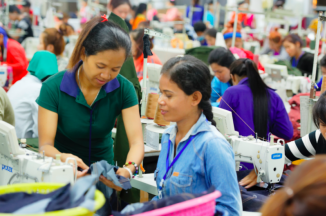Done differently, the global garment industry can potentially lift millions of people out of poverty by providing decent work, empowering women, and driving inclusive economic growth and business competitiveness.
Better Work implements a two-fold strategy to promote compliance with national law and international core labour standards in global garment and footwear supply chains and bolster a more stable and profitability sector that can influence supply chains beyond the garment industry.
Encouraging factories to improve working conditions by...
- Providing practical assistance to factories to help workers and employers in the workplace to engage and cooperate effectively, to self-diagnose and to fix problems themselves. Through IFC-developed trade financing packages, they provide financial incentives in the form of preferential interest rates to factories making improvements.
- Harnessing the commercial influence of leading brands and retailers. They provide them with compliance assessments reports of their suppliers and in turn, ask them commit to use their commercial influence to encourage needed improvements. They also get brands to to stop duplicative monitoring and due diligence programmes, greatly reducing associated costs to factories.
- Publicly disclosing serious non-compliances. The results are disclosed after fair notice is given to the firms to make the required improvements. Reputation management becomes a strong incentive for improvement.
- Demonstrating the business benefits of decent work through independent research based on Better Works unique data-sets.
Helping national stakeholders play a stronger role in governing the labour market...
- Establishing programmes in countries where impact is most likely.
- Working with a critical mass of employers across the sector to create a “tipping point” in business attitudes towards compliance, which reward good compliance.
- Collaborating within the ILO to build the capacity of national institutions, supporting constituents’ requests for assistance in strengthening the labour inspectorate, reducing workplace accident and illness rates, reforming laws and strengthening industrial relations and social protection systems that can have a spill-over effect beyond the garment export sector.
- Accumulating evidence of positive impacts of good employment practices and compliance with labour laws and core labour standards on development, growth and firm success.
- Influencing international buyers and encouraging more responsible sourcing practices, drawing on their experience and research to motivate this.

